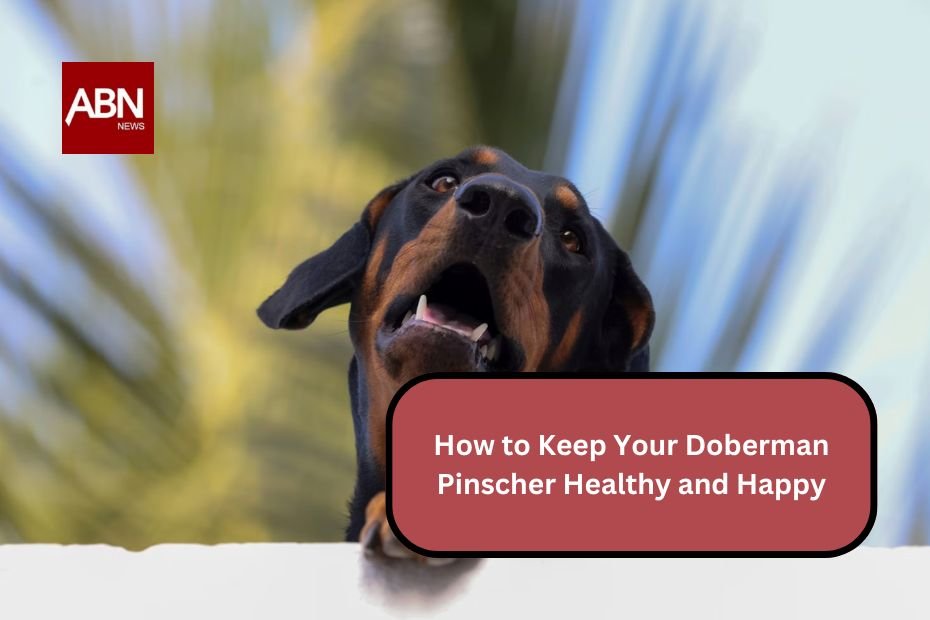Doberman Pinschers are known for their intelligence, loyalty, and energetic nature. Keeping your Doberman healthy and happy requires a combination of proper nutrition, regular exercise, grooming, and veterinary care. Here’s a comprehensive guide to ensure your Doberman thrives.
1. Balanced Nutrition
- High-Quality Diet: Feed your Doberman a high-quality dog food that meets the nutritional standards set by the Association of American Feed Control Officials (AAFCO). Look for foods rich in easily digestible proteins and omega-3 fatty acids to support their overall health, including skin, coat, and heart health.
- Meal Frequency: Dobermans should be fed two meals per day to reduce the risk of gastric dilatation-volvulus (GDV), also known as bloat. Puppies may require three meals a day until they are about six months old.
- Avoid Overfeeding: Monitor portion sizes to prevent obesity, which can lead to various health problems such as joint issues and heart disease. Consult your veterinarian for specific feeding guidelines based on your dog’s age, weight, and activity level.
2. Regular Exercise
- Daily Activity: Dobermans are energetic dogs that need at least 1-2 hours of exercise daily. Engage them in activities like jogging, playing fetch, or participating in dog sports such as agility or obedience training.
- Mental Stimulation: In addition to physical exercise, provide mental challenges through puzzle toys or training sessions. This helps prevent boredom and associated behavioral issues.
3. Routine Veterinary Care
- Regular Check-Ups: Schedule routine veterinary visits for vaccinations and health check-ups. Dobermans are prone to certain health issues like dilated cardiomyopathy (DCM) and von Willebrand disease (vWD), so early detection is key.
- Dental Health: Dental disease is common in dogs, affecting up to 80% by age two. Brush your Doberman’s teeth at least twice a week to prevent tartar buildup and related health issues.
4. Grooming Needs
- Coat Care: Dobermans have short coats that require minimal grooming. Brush their coat weekly to manage shedding and keep it healthy. Bathing should be done as needed, typically once a month or when they get dirty.
- Ear and Nail Maintenance: Clean your Doberman’s ears weekly to prevent infections and trim their nails regularly to avoid discomfort.
5. Socialization and Training
- Early Socialization: Start socializing your Doberman at a young age by exposing them to various people, environments, and other animals. This helps them grow into well-adjusted adults.
- Positive Training Methods: Use positive reinforcement techniques during training sessions. Avoid harsh methods as Dobermans respond better to encouragement and rewards.
6. Provide a Safe Environment
- Secure Living Space: Ensure your home has a securely fenced yard where your Doberman can play safely. They are capable jumpers, so the fence should be tall enough to contain them.
- Supervision: Keep an eye on your Doberman when they are outdoors or in new environments to prevent accidents or ingestion of harmful substances.
7. Monitor Health Changes
- Watch for Symptoms: Be vigilant about any changes in behavior or health, such as lethargy, changes in appetite, or unusual behaviors. Early intervention can make a significant difference in treatment outcomes.
Conclusion
Keeping your Doberman Pinscher healthy and happy involves a holistic approach that includes proper nutrition, regular exercise, grooming, veterinary care, socialization, and creating a safe environment. By investing time and effort into their care, you can ensure that your Doberman thrives both physically and emotionally, leading to a long, fulfilling life as a cherished member of your family.
| HOME | CLICK HERE |
| CATEGORY | CLICK HERE |

